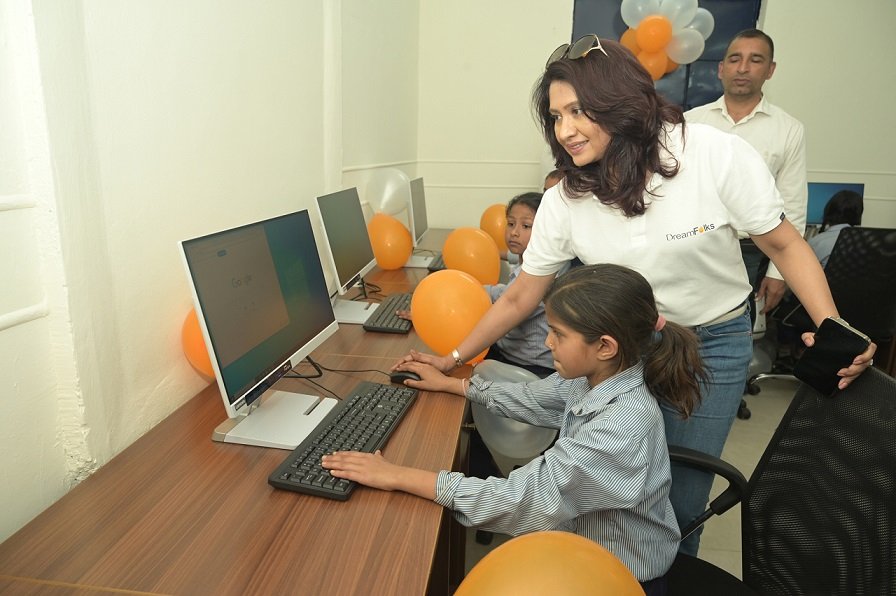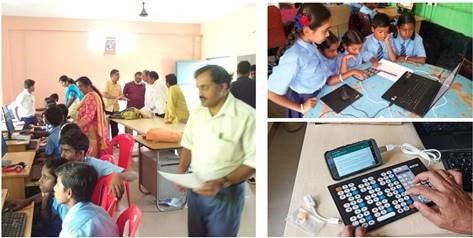Discover how Ka-Naada’s patented mother tongue keyboards and language labs are revolutionizing digital literacy in rural Indian schools, bridging the gap between local languages and English learning.
Language Lab Experimentation
a-Naada experimented with a “Language Lab” system with a patented hardware-based mother tongue keyboard for Indian languages just prior to COVID. We had to adapt pocket computers, servers, and offline lessons, with computers that could work with electricity and internet interruptions, making it affordable for rural schools. Children in mother tongue mediums like Telugu, Hindi, or Kannada could now type from primary schools using Ka-Naada keyboards without the knowledge of English or an English keyboard. They could also learn English. Just then, COVID-19 struck, and online lessons were accessible to only 55% of the students in these rural schools. The Indian education system underwent a rapid change due to the COVID-19 situation, and digital lessons became normal in urban settings.
The Digital Divide in Education
The digital divide was severe between Digital Bharath and Digital India. There was reluctance in many to return to school since they were a year behind their classmates who had digital access. We designed an intervention system with a language lab assistant who had a portable server system and a mother tongue keyboard. This assistant would reach common areas like village panchayats, digital libraries, or common areas where some access was possible and encouraged students to return to schools and take the 10th exams.
The challenge, however, was to retrain the two groups of students at schools. Language labs in schools were restarted, and we are thankful for the allocation of an hour per week to allow students to catch up with the Reinforced Learning methodology, Ka-Naada keyboards, and content.
Retraining English Skills
Indian students’ English skills in tier II, III cities need drastic modifications and retraining to meet international expectations for passing 10th exams, employability, presentation, and communication. The company designed a mind map technique for these students to use their mother tongue, remember key terms, and practice sentence completion using English. Experts, including those from the British Council, concur that the solution to this Himalayan problem needs corrective action right from the early schooling phase.

Ka-Naada Keyboard as a Solution
“Here we have now a solution in the Ka-Naada keyboard anchored language-lab as a solution to this problem. NEP was also introduced last year and had its own challenges in providing mother tongue keyboards, digital interfaces, environment, and ecosystem in a short time. The language lab was a blessing in disguise to these students and staff in implementing NEP,” the company said.
Challenges of English Teaching in Schools
‘English Teaching’ is a fundamental issue faced as part of NEP implementation in schools from primary to high school at about 8,47,118 primary schools and 4,25,094 higher primary schools across India, covering needs in 26 states using 16 scripts, along with English. Out of these, 65% are government-funded/managed schools.
Gaps in Meeting English Learning Expectations
There is a wide gap in meeting the ‘English learning’ expectation from a jobs point of view and a lack of user interfaces in mother tongue and lab exercise content for NEP. A mother tongue-based pedagogy to learn English is necessary for a nationwide delivery mechanism to achieve basic skills. Currently, Ka-Naada multilingual keyboards with a patented layout are available in 10 Indian languages along with English.
Language Lab Implementation in Karnataka
Ka-Naada keyboard empowered ‘Language-Lab’ for the last eighteen months runs at a semi-urban school, in partnership with Rotary Club at Rajankunte, Karnataka. It has demonstrated how to provide digital access in the mother tongue and make ‘English Learning’ more effective and efficient for rural students and first-time computer learners.
The design of the language lab accommodates ‘English skills’ acquisition as part of the NEP pilot implementation project for mother tongue digital literacy and numeracy. Online resources were also available in Ka-Naada Gurukula in a structured manner. Ka-Naada is a hardware keyboard, and via USB, it connects to an existing digital/smart device. Students with digital access at home can also work from home using the keyboard. With one keyboard, one can type in any Indian language as well.
Expanding Language Labs in Rural Schools
Ka-Naada plans to provide Language-labs as a foundational platform to make a positive impact on delivering Indian language as well as English language skills through schools, especially rural schools, without sacrificing or subsuming Indian language digital literacy interests. Ka-Naada language-lab has so far launched working units at more than a hundred government schools, using helpful charities from NRI families. Imparting language skills in early schooling is a lifelong investment and is considered a good use of money spent on education during the formative years of a child’s life.
Ka-Naada’s Partnerships and Implementation
Ka-Naada has partnered with the Rotary Club’s global education promotion program and has so far implemented the language lab at several rural schools, working satisfactorily. Ka-Naada would like to partner with NGOs and corporations to achieve digital literacy goals in rural schools in India.
The remedial strategy through Ka-Naada language labs proposes enhanced inclusive units to existing school infrastructure with a training program under the NEP2020 policy pointers and goals.
This approach also envisages capacity building of school staff towards new-age innovative pedagogy. The 360-degree approach covering school, staff, and students is assured to bring out maximum impact within the designed time frame.
Reducing the Digital Divide
The USP of the Ka-Naada language lab project is that it reduces the digital divide in mother tongue-based mediums and provides a quantum jump to integrate with 21st-century digital infrastructure and online education models.
The project scope seamlessly embraces infrastructure and opportunities for integrating multiple skills and expectations related to learning English, digital literacy in Indian languages, mother tongue, and STEM skills.
The Need for a Shift in School Education
There is an urgent need to redirect the focus of school education from an emphasis on rote learning and knowledge of facts towards play-based activities that build memory, critical reasoning, and problem-solving abilities. Unfortunately, the pressure of completing the syllabus outpaces the student’s ability to comprehend lessons.
Transforming school education through a quantum leap in improving learning outcomes will align the ecosystem with our aspirations for growth and prepare the workforce in tune with the changing demands of the industry.
Comprehensive Remediation Strategy
Given the gap in learning, there is a need to activate a comprehensive remediation strategy through digital infrastructure, and enhanced infusion of support to make ‘Learning English’ and digital learning of Indian languages with practice classes, activity sessions, and pedagogy on a larger scale across India.
(India CSR)























